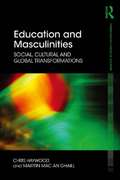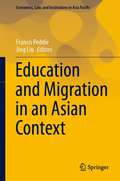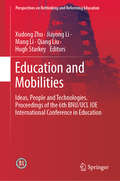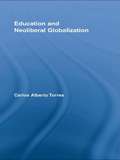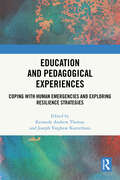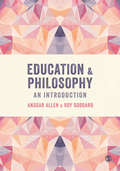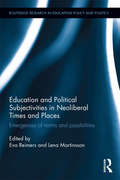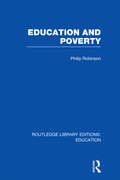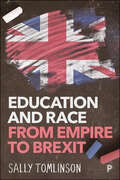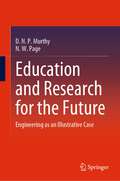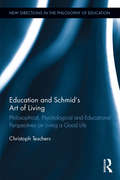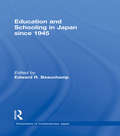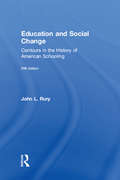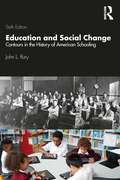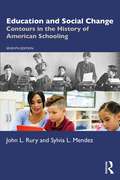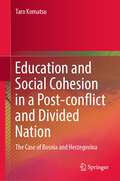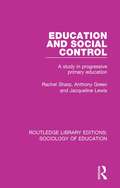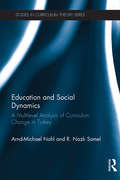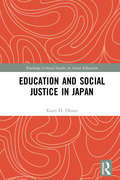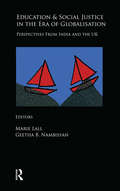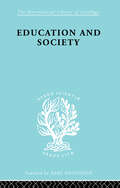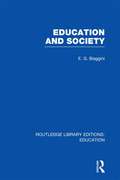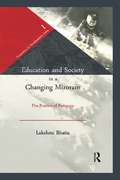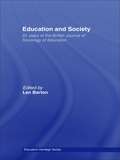- Table View
- List View
Education and Masculinities: Social, cultural and global transformations (Foundations and Futures of Education)
by Chris Haywood Mairtin Mac an GhaillAcross media, academy and popular culture in western societies there is much talk of an implosion of the modern gender order. Education is often presented as a key site in which a crisis of masculinity is played out, and schools have become a focus for practical attempts to reconcile social and cultural transformations through the recalibration of teaching and learning, increasing male teachers and masculinising the content of subjects. Education and Masculinities argues that we are experiencing a shift from the establishment of the social constitution of gender associated with modernity politics, to the gendering of society that has an intensified resonance among men and women in a global-based late modernity. The book explores the main social and cultural approaches to education and masculinities within the broader context of sex and gender relations, considering the masculinity question alongside local and global changes in society, and bringing a fresh evaluation of key issues. Included in the book: -how the suggestion of ‘academically successful girls’ and ‘failing boys’ plays out in relation to issues of inequality across class and ethnicity -a current empirical analyses of gender inequality across schools, higher education and the labour market -representation, identity and cultural difference with reference to male and female social experiences and cultural meanings -forms of power connected to social divisions and cultural differences. Education and Masculinities provides a critical yet constructive diagnosis of gender relations across educational sites, exploring both academic accounts and alternative global responses that illustrate the limits of Western models and sensibilities.This accessible book will be valuable reading for students following courses in education, sociology, gender studies, and other social sciences and humanities courses.
Education and Migration in an Asian Context (Economics, Law, and Institutions in Asia Pacific)
by Jing Liu Francis PeddieThis edited book explores the complex and multifaceted connections between education and migration in an Asian context from multiple perspectives. It features studies from China, Japan, India, the Philippines, Thailand, and Timor-Leste and covers diverse migration and education experiences. These experiences encompass internal and international migration and forced displacement, as well as questions surrounding education such as school choice, education provision and training as human capital; education and social inclusion; and student performance in a post-conflict context. By covering a wide range of questions and situations, the original scholarship in this book reveals how human development concerns and higher rates of movement within and outside of Asian countries operate on multiple levels in a globalized world.
Education and Mobilities: Ideas, People and Technologies. Proceedings of the 6th BNU/UCL IOE International Conference in Education (Perspectives on Rethinking and Reforming Education)
by Xudong Zhu Mang Li Qiang Liu Hugh Starkey Jiayong LiThis book gathers selected original papers presented at the Sixth Beijing Normal University - University College London, Institute of Education International Conference in Education, a biennial event organised in partnership between this two universities. Readers will find a wealth of papers and reports on research involving schools and the initial and professional development of teachers, revealing links between research, policy and practice, while also analyzing key themes in education, including public goals and policies, pedagogy, curricula, organisation, resources and technologies, and institutional effectiveness. An essential guide for anyone who wishes to understand the main issues involved in mobilities of ideas, people and technology in the field of education, the book offers an extensive introduction, and can also be used as a resource for empirical and conceptual research into related issues.
Education and Neoliberal Globalization (Routledge Research in Education #Vol. 18)
by Carlos Alberto TorresThis volume by noted critical education scholar Carlos Alberto Torres takes up the question of how structural changes in schooling and the growing impacts of neoliberalism and globalization affect social change, national development, and democratic educational systems throughout the world. The first section of the book offers analytical avenues to understand and criticize the practices and policies of neoliberal states, both domestically and internationally. More than a mere lament of the state of educational policy, however, Torres also documents the critiques and alternatives developed by social movements against neoliberal governments and policies. Ultimately, his work urges readers to engage in the struggle to resist the oppressive forces of neoliberal globalization, and proactively and deliberately act in informed ways to create a better world.
Education and Pedagogical Experiences: Coping with Human Emergencies and Exploring Resilience Strategies
by Joseph Varghese Kureethara Kennedy Andrew ThomasThis book analyses how the educational ecosystem undergoes a paradigm shift during human emergencies – be it natural, manmade, environmental, ethnic or a global pandemic like COVID-19. It discusses varied approaches, experiences, and the steadfast desire to share information, demonstrating the value of teaching and learning in difficult conditions.This volume aims to build resilience and inspire young minds to persevere through challenging times. It explores the continuity of education during emergencies, various teaching and learning approaches, and the importance of maintaining a resilient attitude. Each addresses the cultural and locational specifics of emergencies, illustrating how education and pedagogy have made a global impact. They also examine a specific aim, enriched by cultural, geographical, and human variables, and how education and pedagogy aim to resolve these concerns.This book would be useful to students, researchers and teachers working in Education, Environmental Science and Disaster Management, Political Science, Public Administration, International Relations, Peace Education, Psychology and Cognitive Science, Neuroscience, Sociology and Social work. It would also be an invaluable companion to practicing pre-service and in-service teachers and their trainers, policy makers, professionals from government and non-government organizations working in education and social development.
Education and Philosophy: An Introduction
by Ansgar Allen Roy GoddardPhilosophy is vital to the study of education, and a sound knowledge of different philosophical perspectives leads to a deeper engagement with the choices and commitments you make within your educational practice. This introductory text provides a core understanding of key moments in the history of Western philosophy. By introducing key transition points in that history, it investigates the plight of present day education, a period in which the aims and purposes of education have become increasingly unclear, leaving education open to the rise of instrumentalism and the forces of capital. Accessibly written, the book carefully analyses the common assumptions and conflicted history of education, provoking questioning about its nature and purposes. The authors argue vigorously that thinking critically about education from a philosophical perspective will give practicing and trainee teachers, as well as students on undergraduate Education and Masters-level courses a fuller command of their own role and context.
Education and Philosophy: An Introduction
by Ansgar Allen Roy GoddardPhilosophy is vital to the study of education, and a sound knowledge of different philosophical perspectives leads to a deeper engagement with the choices and commitments you make within your educational practice. This introductory text provides a core understanding of key moments in the history of Western philosophy. By introducing key transition points in that history, it investigates the plight of present day education, a period in which the aims and purposes of education have become increasingly unclear, leaving education open to the rise of instrumentalism and the forces of capital. Accessibly written, the book carefully analyses the common assumptions and conflicted history of education, provoking questioning about its nature and purposes. The authors argue vigorously that thinking critically about education from a philosophical perspective will give practicing and trainee teachers, as well as students on undergraduate Education and Masters-level courses a fuller command of their own role and context.
Education and Political Subjectivities in Neoliberal Times and Places: Emergences of norms and possibilities (Routledge Research in Education Policy and Politics)
by Lena Martinsson Eva ReimersEducation and Political Subjectivities in Neoliberal Times and Places investigates the conditions and possibilities for political subjectivities to emerge in international educational contexts, where neoliberal norms are repeated, performed and transformed. Through demonstrating the possibility of political subjectivities, this book argues that neoliberalism should neither be considered post-political, nor a natural law by which educational practices have to abide. This book considers how political subjectivities are made possible in education in spite of dominant neoliberal norms. Chapters address key theoretical discussions surrounding these different, sometimes contradicting, norms and their relationship to education, economy and politics. This innovative approach considers diverse educational and political initiatives in the wake of new public management, postcolonial perspectives on neoliberal education, and educational practices and critical possibilities. The book advocates understanding and enacting democracy as an experiment, based on the conception that democracy is constantly constructed and constitutes a transformative process in society in general as well as in education. This book advances the argument that there is still room for political subjectivity in spite of the dominance of neoliberal educational governance. It will appeal to researchers, academics and postgraduate students in the fields of higher education, education policy and politics, sociology of education and comparative and international education, as well as those interested in neoliberalism, new public management, and inequality.
Education and Poverty (Routledge Library Editions: Education)
by Philip RobinsonThis book describes the attempts that have been made to achieve an educational policy relevant to those most disadvantaged in our society; examines the different ways in which sociologists have conceptualized the related problems; and evaluates the success of the policy. He suggests that we are in need both of a more realistically defined view of what schools can do and a concerted official approach to compensatory policy.
Education and Race from Empire to Brexit
by Sally TomlinsonCovering the period from the height of Empire to Brexit and beyond, this book shows how the vote to leave the European Union increased hostilities towards racial and ethnic minorities and migrants. Concentrating on the education system, it asks whether populist views that there should be a British identity - or a Scottish, Irish or Welsh one - will prevail. Alternatively arguments based on equality, human rights and economic needs may prove more powerful. It covers events in politics and education that have left most white British people ignorant of the Empire, the often brutal de-colonisation and the arrival of immigrants from post-colonial and European countries. It discusses politics and practices in education, race, religion and migration that have left schools and universities failing to engage with a multiracial and multicultural society.
Education and Research for the Future: Engineering as an Illustrative Case
by D. N. Murthy N. W. PageThis book takes a fresh look at the fundamental character of education, its history, interaction with society, purpose, changing focus over time and interactions with technology. It surveys the role of research in increasing the body of knowledge leading to new technologies that have helped serve the needs of humankind.In our lifetime there have been profound changes to the world we live in; the technologies used, the problems we struggle with, and the education systems intended to prepare this and following generations for the future. Many of the problems we face now are more complex than in earlier times, requiring broadly based approaches our traditional silo specialisations are ill-prepared to deal with. They involve technologies whose range of positive and negative effects are not well understood. Many of these problems are global in nature and can no longer be treated just as local issues. Our current approach to education does not adequately prepare us to tackle these problems.New approaches to education are needed to prepare us for the changes that are to come. The future of our planet, our civilisation, our community and our economy depend on it. This book proposes changes that will better prepare us for this future.
Education and Schmid's Art of Living: Philosophical, Psychological and Educational Perspectives on Living a Good Life (New Directions in the Philosophy of Education)
by Christoph TeschersInstead of simply following the current neoliberal mantra of proclaiming economic growth as the single most important factor for maintaining well-being, Education and Schmid’s Art of Living revisits the idea of an education focused on personal development and the well-being of human beings. Drawing on philosophical ideas concerning the good life and recent research in positive psychology, Teschers argues in favour of shifting the focus in education and schooling towards a beautiful life and an art of living for today's students. Containing a thorough discussion of the ideas of contemporary German philosopher Wilhelm Schmid, this book considers the possible implications of developing a more humanistic and life-centred approach to educational policy, research and practice, showing that Schmid’s concept of Lebenskunst provides a firm philosophical basis for this endeavour. Among others, this book draws on analytical and continental traditions to challenge current views and assumptions in regard to education and the role of schooling for contemporary societies. As a result, Teschers’ work is sure to spark a debate about the direction of educational policy and practice in the 21st century. Education and Schmid’s Art of Living is essential reading for academics and students with an interest in education. Given the importance of such topics as the relationship between education and society, teacher education and how best to structure schools and learning environments, Teschers’ work will appeal to academics and students in a diverse range of fields, including education, philosophy, sociology and psychology.
Education and Schooling in Japan since 1945 (Dimensions of Contemporary Japan #Vol. 3)
by Edward R. BeauchampFirst Published in 1999. Routledge is an imprint of Taylor & Francis, an informa company.
Education and Social Change
by John L. RuryThis brief, interpretive history of American schooling focuses on the evolving relationship between education and social change. Like its predecessors, this new edition investigates the impact of social forces such as industrialization, urbanization, immigration and cultural conflict on the development of schools and other educational institutions. It also examines the various ways that schools have contributed to social change, particularly in enhancing the status and accomplishments of certain social groups and not others. Detailed accounts of the experiences of women and minority groups in American history consider how their lives have been affected by education. Changes in this new edition include the following: A more thorough treatment of key concepts such as globalization, human capital, social capital, and cultural capital. Enhanced attention to issues of diversity throughout. Greater thematic coherence as a result of dividing chapter 6 into two chapters, the first focusing on the postwar period and emphasizing the themes of equity and social justice and the second focusing on human capital in education, highlighting the standards movement, federal policy changes and neo-liberal reform. A revision of several focal point discussions for greater clarity and thematic releance. Update discussions of recent changes in educational politics, finance and policy, especially the troubles presently facing No Child Left Behind (NCLB).
Education and Social Change: Contours in the History of American Schooling
by John L. RuryThis brief, interpretive history of American schooling focuses on the evolving relationship between education and social change. Like its predecessors, this new edition investigates the impact of social forces such as industrialization, urbanization, immigration, and cultural conflict on the development of schools and other educational institutions. It also examines the various ways that schools have contributed to social change, particularly in enhancing the status and accomplishments of certain social groups and not others. Detailed accounts of the experiences of women and minority groups in American history consider how their lives have been affected by education at key points in the past. Updates to this edition A revised final chapter updated to include recent changes in educational politics, finance, policy, and a shifting federal policy context Enhanced coverage and new conceptual frames for understanding the experiences of women and people of color in the midst of social change Edited throughout to update information and sources regarding the history of American education and related processes of social transformation in the nation’s past
Education and Social Change: Contours in the History of American Schooling
by John L. Rury Sylvia L. MendezThis concise, interpretive history of American schooling focuses on the evolving relationship between education and social change.Like its predecessors, this fully updated new edition investigates the impact of social forces such as industrialization, urbanization, immigration, globalization, and cultural conflict on the development of schools and other educational institutions. It also examines the various ways that schools have contributed to social change, particularly in enhancing the status and accomplishments of certain social groups and not others. Detailed accounts of the experiences of women and minority groups in American history consider how their lives have been affected by education at key points in the past.Updates to the seventh edition include: Enhanced coverage for understanding the experiences of Native Americans, students in poverty settings, and the LGBTQ+ community in the midst of social change. New topics include settler colonialism, indigeneity, culturally diverse education, gay and transgender educational policies, charter schools, voucher programs, and the rise of testing in schools. It has been edited throughout to update information and sources regarding the history of American education and related processes of social transformation in the nation’s past.This bestselling introductory text is essential reading for Educational Foundations, History of Education, and Schools and Society, and similar courses for pre-service teachers, educational leaders, and others.New online material includes discussion questions and links to further reading and resources, available at www.routledge.com/9781032745947
Education and Social Cohesion in a Post-conflict and Divided Nation: The Case of Bosnia and Herzegovina
by Taro KomatsuThis book discusses education’s role of developing social cohesion in a post-conflict environment where tensions continue to exist between the three “constituent” ethnic groups. It offers fresh insights into the relationship between education and social cohesion in a specific context of Bosnia & Herzegovina, where the need to rebuild social trust is acutely felt. This book first elaborates the concept of social cohesion and illustrates possible mechanisms through which education can develop, or further erode, social cohesion in already divided societies. Then, it carefully examines such mechanisms, using a case study of a Bosnia & Herzegovina which witnessed violent conflict instigated by ethno-identity politics during 1992-1995, and has been struggling to reconstruct its broken social fabric since then.
Education and Social Control: A Study in Progressive Primary Education (Routledge Library Editions: Sociology of Education #49)
by Anthony Green Rachel Sharp Jacqueline LewisFirst published in 1975, this book offers a critique of some of the ‘new perspectives’ in the sociology of education. This is achieved through a case study of a progressive child centred school. The book suggests that a liberal approach to education fails to appreciate how thoroughly a complex, stratified industrial society penetrates the school. It argues that the practice of ‘progressive’ education may be a modern form of conservativism and an effective form of social control both in the narrow sense of achieving classroom discipline and in the wider sense of contributing to the promotion of a static social order. It cautions against naïve utopian solutions which see the freedom and self-development of the child as an individualized process, unrelated to a social context which may undermine the ideals of freedom and spontaneous self-development. In addition to offering a study of the implementation of the ‘open’ approach to child development and pedagogy, the book can also be read as a piece of critical sociology, intended to make the reader look again at the way in which problems have been generated and solutions proposed within sociology and education.
Education and Social Dynamics: A Multilevel Analysis of Curriculum Change in Turkey (Studies in Curriculum Theory Series)
by Arnd-Michael Nohl R. Nazlı SomelEducation and Social Dynamics offers a new approach to analyzing curriculum change by investigating the entanglement of education and society in markedly heterogeneous Turkey, which has recently witnessed nation-wide curriculum reforms. While the new curriculum has attempted to homogenize all Turkish primary schools since 2005, Nohl and Somel, drawing on a theoretical differentiation of social entities, reveal how subsequent curricular practices have had to account for the diversity of milieus and organizations in the nation’s educational sector, and how inequality and competition run rampant in the standardization efforts. Using expert interviews, group discussions, and other empirical data that compare instructional practices within five distinct schools, the book represents a breakthrough in our understanding of developments in Turkey and their significance for extant theories of curriculum development and reform worldwide. By linking specific case study material from Turkey to intensifying international concerns, it provides an important and relevant global commentary.
Education and Social Justice in Japan (Routledge Critical Studies in Asian Education)
by Kaori H. OkanoThis book is an up-to-date critical examination of schooling in Japan by an expert in this field. It focuses on developments in the last two decades, with a particular interest in social justice. Japan has experienced slow economic growth, changed employment practices, population decline, an aging society, and an increasingly multi-ethnic population resulting from migration. It has faced a call to respond to the rhetoric of globalization and to concerns in childhood poverty in the perceived affluence. In education we have seen developments responding to these challenges in national and local educational policies, as well as in school-level practices. What are the most significant developments in schooling of the last two decades? Why have these developments emerged, and how will they affect youth and society as a whole? How can we best interpret social justice implications of these developments in terms of both distributive justice and the politics of difference? To what extent have the shifts advanced the interests of disadvantaged groups? This book shows that, compared to three decades ago, the system of education increasingly acknowledges the need to address student diversity of all kinds, and delivers options that are more varied and flexible. But interest in social justice in education has tended to centre on the distribution of education (who gets how much of schooling), with fewer questions raised about the content of schooling that continues to advantage the already advantaged. Written in a highly accessible style, and aimed at scholars and students in the fields of comparative education, sociology of education and Japanese studies, this book illuminates changing policies and cumulative adjustments in the daily practice of schooling, as well as how various groups in society make sense of these changes.
Education and Social Justice in the Era of Globalisation: Perspectives from India and the UK
by Marie Lall; Geetha B. NambissanThe book discusses the implications of globalization on education from the perspective of social justice. It looks at two countries — India and the UK — to look at how global economic and cultural processes are mediated through nation states, institutional structures and the aspirations of different social groups. It seeks to resituate the debates around education and social justice in policy, research and public discourse by highlighting the need for a more nuanced understanding of globalization and education. It also demonstrates the effects of economic dimensions — the politics of neoliberalism, and how this has shifted the understanding of state responsibilities and marginalized issues pertaining to the agenda of social justice.
Education and Society (International Library of Sociology #Vol. 5)
by A.K.C. OttawayThis volume is an introduction to the sociology of education and was originally published in 1953. This volume will be useful for teachers in university training departments and training colleges, as an introductory study that expounds the social significance of education.
Education and Society (Routledge Library Editions: Education #166)
by E. G. BiagginiThis volume discusses how the lay-person responds to written appeals to his intelligence and feelings with particular emphasis on education and culture. The author indicates a possible approach to the task of investigation rather than all that can be done with the method employed. The second part deals with educational questions relevant to the evidence and examines the social implications of this evidence.
Education and Society in a Changing Mizoram: The Practice of Pedagogy (Transition in Northeastern India)
by Lakshmi BhatiaLocated in the domain of cultural politics, the book with rich ethnographical data from Mizoram, a lesser known and understood state, brings the community, state and culture to centre-stage, along with family and stratification of the sociological discourse in education. The book argues for a re-look at school education in Mizoram, besides providing critical insights into the North East region as a whole. It also points to the dilemmas of development in that region and suggests possible ways out of the impasse. Marking a significant departure from conventional thinking on education as 'human capital' as reflected in North-East Vision: 2020, the book strongly advocates the need for critical pedagogies based on learning from conflict; inculcating the values of tolerance and compassion as a precursor to peace; reconceptualising `development, not merely as 'economic' but as indicator of national happiness and valuing lives equally besides respect for traditional institutions, thus marking a break from the much resented paternalism that underpins all state interventions in education. One of the first studies of its kind regarding experience and practice of education, the book makes an important contribution to the role that education can play to usher in peace and promote respect for differences.
Education and Society: 25 Years of the British Journal of Sociology of Education (Education Heritage)
by Len BartonThe British Journal of Sociology of Education has established itself as the leading discipline-based publication. This collection of selected articles published since the first issue provides the reader with an informed insight and understanding of the nature, range and value of sociological thinking, its development over the last twenty-five years as well as the analysis of the relationship between society and education. Divided into four sections, the book covers: social theory and education social inequality and education sociology of institutions, curriculum and pedagogy research practices in the sociology of education. The intention of this form of organisation is to provide the reader with an awareness and understanding of multiple perspectives within the discipline as well as key conceptual, theoretical and empirical material, including a wealth of insights, ideas and questions. The editor’s specially written introduction to each section contextualises the selection and introduces readers to the main issues and current thinking in the field.
